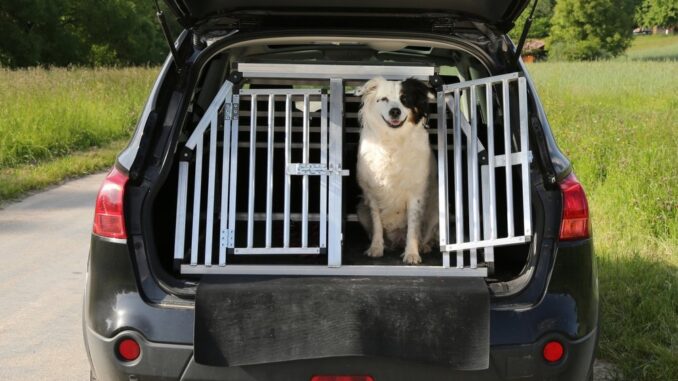
Each year, more and more pet owners take their dogs and cats on the road, but traveling can be a little trickier with a furry family member. To help make traveling less stressful for you and your pets, here are a few things to consider before toting your animals wherever you go.
Dogs in Cars
When driving, there are a few different options for safely transporting canines. Use a dog carrier that is large enough for them to stand and turn around in. Letting your dog roam free in the car without restraint is never a good idea, though some dogs might tolerate a canine seatbelt, which is a harness that attaches to the car’s seatbelt. Another option would be using a divider or barrier for safe transportation of larger dogs in the back of a hatchback or SUV.
If traveling by truck, always secure a pet carrier with a harness specifically designed for a truck bed. Simply tying your dog’s leash to the truck is not recommended, as the dog may end up jumping or falling out of the truck. If a dog is still attached to the leash when this occurs, there could be fatal consequences. Because accidents can happen with even the most cautious of pet owners, it’s always a good idea to have dog insurance as a backup.
Cats in Cars
Contrary to popular belief, car travel is possible with cats. Placing your cat in a carrier is highly recommended. Cats can be quite vocal when riding, but will usually quiet down over time. Synthetic feline-calming pheromones such as Feliway sprays are very helpful to calm a stressed kitty. Prior to your trip, allowing your cat to acclimate to the carrier is also a good idea. Place food, water and toys inside the carrier and allow your cats to come and go until they feel comfortable.
Pets and Car Sickness
Pets can get motion sickness just like people. It’s common for puppies to vomit during their first couple of car rides. Most dogs will outgrow motion sickness, but you can try withholding a meal right before your trip to help ease nausea. However, be cautious about withholding meals among small breed puppies, which need to access food often in order to prevent low blood sugar. Most anti-nausea medications such as Dramamine and Benadryl are safe to use in dogs, but always talk to your veterinarian before giving any amount to your pets.
Pet Sedation
Sedatives are only recommended for car travel if pets are likely to cause harm to themselves, you or your property. The biggest reason for this is that if your pet has a reaction to a sedative while you are on the road, your access to veterinary care could be limited, and you may not even notice there’s a problem while driving. If your veterinarian agrees that your pet would benefit from a mild sedative or anti-anxiety medication such as Xanax, discuss testing the medication prior to your trip. By doing a trial run before you go, you will be able to see how your pet react and what dose works best. In case of a negative reaction, veterinary care is available. Many pet health insurance companies like Pets Best will even help cover a portion of medications such as these.
For more information, visit www.petsbest.com.

